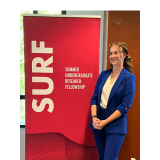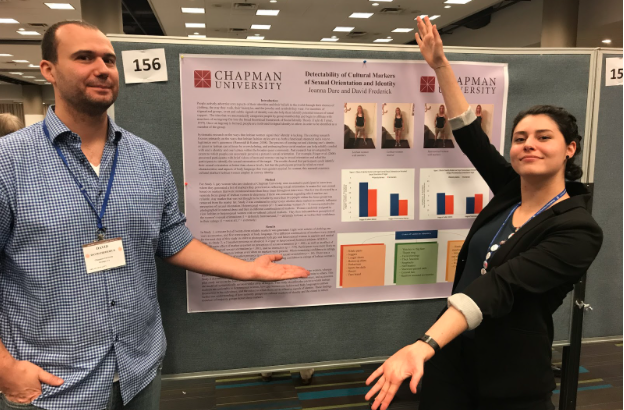
Joanna Dare (’18) asks, “To what extent are lesbian markers noticeable to mainstream culture?” This senior psychology major uses scientific inquiry to understand expressions of queer identity and the implications of cultural markers.
April 17, 2018
There seems to be no “one size fits all” when it comes to finding an academic or creative niche. Some students become inspired in the classroom, intrigued by the passionate pursuits of their professors. Others are born with an unanswered question that begs an answer only satisfiable through academic inquiry. For Joanna Dare (’18), a senior Psychology major and Law, Justice, and Social Control minor, her path to research took an introspective approach. “I was really interested in contributing to the literature and research on the LGBTQ community…there is also the saying that ‘research is me-search’ and this idea is something I have had personal experience with!” says Dare of her current project.
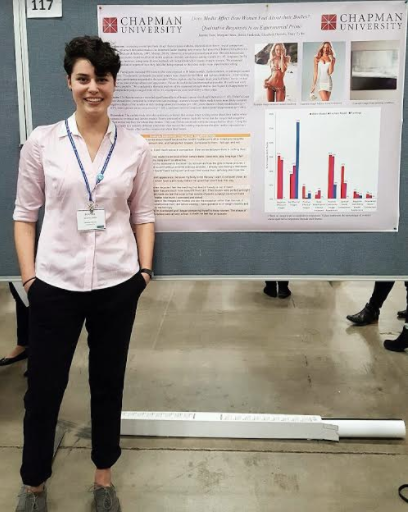 Entitled “Signaling Identity While Avoiding Stigma: Functional Uses of Cultural Markers of Sexual Orientation,” Dare’s research centers upon identifying cultural markers that queer women use to signal their identity to other women, and the public at large. Essentially, Dare wanted to understand the ways in which queer women express their sexual orientation using physical indicators. Of her research, she says, “My goal for the project was to provide an indication to what extent lesbian markers are noticeable to mainstream culture, along with how gay women use fashion and body language to embed themselves in the subculture, and the extent to which these act as effective signals of identity.”
Entitled “Signaling Identity While Avoiding Stigma: Functional Uses of Cultural Markers of Sexual Orientation,” Dare’s research centers upon identifying cultural markers that queer women use to signal their identity to other women, and the public at large. Essentially, Dare wanted to understand the ways in which queer women express their sexual orientation using physical indicators. Of her research, she says, “My goal for the project was to provide an indication to what extent lesbian markers are noticeable to mainstream culture, along with how gay women use fashion and body language to embed themselves in the subculture, and the extent to which these act as effective signals of identity.”
For Dare, the road to research at Chapman University was one she had not anticipated. She says, “One of the reasons I chose Chapman was because of the small class sizes…I saw that as an opportunity to get a more individualized education. I knew that I wanted to major in psychology because I saw it as a strong foundation for so many different fields and careers, but I did not expect to become as involved in the department as I am.” Dare has been involved in research work under the mentorship of Dr. David Frederick for the past two and a half years, and within the last year has taken on the position of lab manager. This semester, the Center for Undergraduate Excellence is proud to claim her as one of our Fall 2017 Grant Recipients.
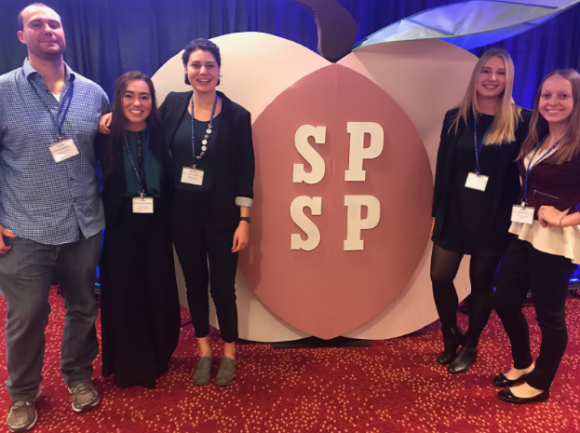
Dr. David Frederick, [insert name], Joanna Dare, [name], and [name] (left to right) at the Society for Personality and Social Psychology, in Atlanta, Georgia.
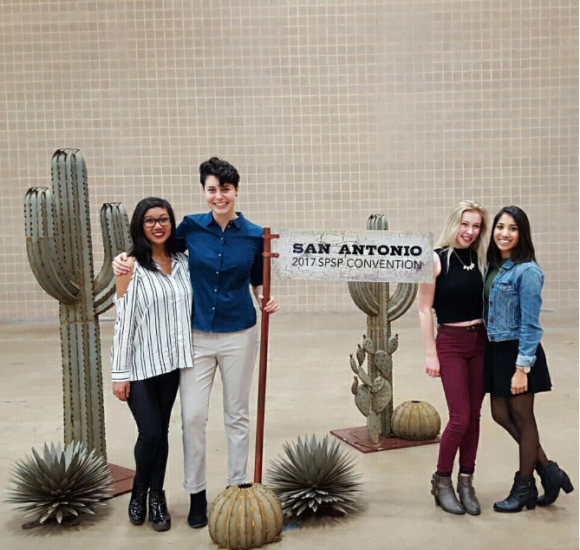
Lab colleagues [name], Joanna Dare, [name], and Yasmin Akbari (left to right) at the 2017 Society for Personality and Social Psychology conference in San Antonio.
Though the task of psychological research can be tedious and sometimes fruitless, Dare’s own study has made significant strides in the direction of illuminating the underrepresented experience of the LGBTQ+ community. In summary, Dare explains, “We found that there was a main effect of marker presence on the perception of sexual orientation, which means participants were more likely to assume the woman in the photograph in the survey was gay if she was wearing markers, whether or not the woman in the photograph was actually gay or straight. This indicates that there are physical markers that can reliably communicate sexual orientation.” But Dare’s research does not rest at this finding; she plans to take her project a step further, exploring whether the identified markers contribute to the perpetuation of stereotyping, stigmatization, and prejudice toward the individuals displaying those markers.
To other students interested in getting involved in undergraduate research, Joanna Dare offers advice from her years in the lab: “Definitely don’t be afraid to make connections with your favorite professors, and reach out to them if they run a research lab that you are interested in joining. Each lab is very different and has different focuses, so look into which one best represents your passions.”
For more information about undergraduate research and creative activity, don’t forget to follow and like the Center for Undergraduate Excellence on Facebook!
Want to get the real low-down on the research experience from a peer? Reach out to one of our Scholar Ambassadors today and find out what it’s really like to pursue undergraduate research!

